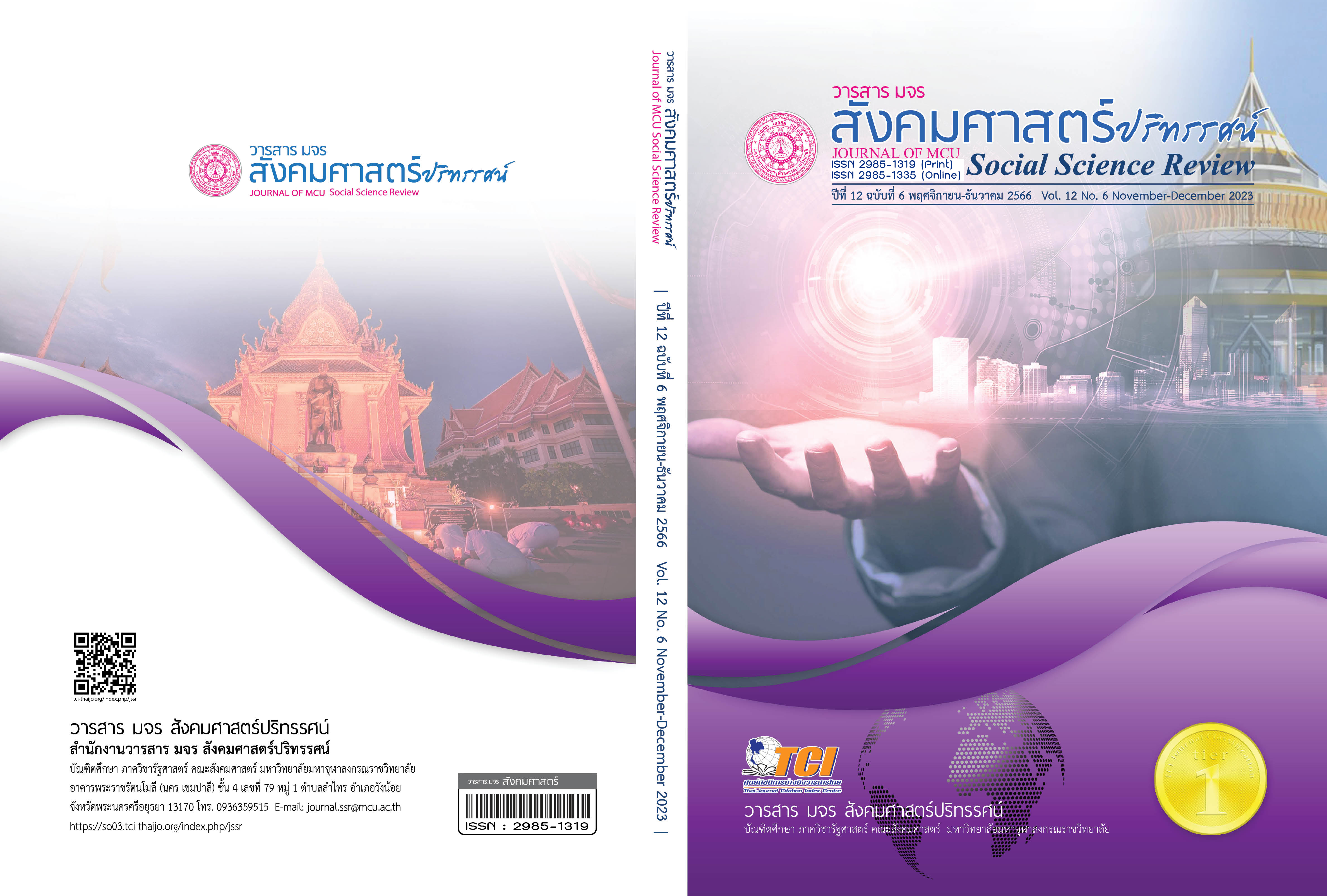ความต้องการจำเป็นของการพัฒนาการบริหารโรงเรียนมัธยมศึกษา สู่การเสริมสร้างกรอบความคิดแบบเติบโตของนักเรียน
คำสำคัญ:
ความต้องการจำเป็น, การบริหารโรงเรียนมัธยมศึกษา, กรอบความคิดแบบเติบโตบทคัดย่อ
บทความวิจัยนี้มีเพื่อศึกษาความต้องการจำเป็นของการพัฒนาการบริหารโรงเรียนมัธยมศึกษาสู่การเสริมสร้างกรอบความคิดแบบเติบโตของนักเรียน เป็นการวิจัยเชิงปริมาณ กลุ่มตัวอย่าง ได้แก่ โรงเรียนมัธยมศึกษา สังกัดสำนักงานคณะกรรมการการศึกษาขั้นพื้นฐาน จำนวน 274 โรงเรียน โดยใช้วิธีการสุ่มตัวอย่างแบบหลายขั้นตอน สำหรับผู้ให้ข้อมูล ได้แก่ ผู้อำนวยการโรงเรียนและรองผู้อำนวยการโรงเรียน จำนวน 343 คน และครูผู้สอนระดับมัธยมศึกษา จำนวน 752 คน เครื่องมือที่ใช้ในการวิจัย คือ แบบสอบถามมาตรประมาณค่า 5 ระดับ มีค่าความเที่ยงเท่ากับ 0.994 วิเคราะห์ข้อมูลโดยใช้ ค่าเฉลี่ย ส่วนเบี่ยงเบนมาตรฐาน และค่าดัชนีความต้องการจำเป็น (PNI Modified)
ผลการวิจัยในด้านการบริหารงานวิชาการโรงเรียนมัธยมศึกษา พบว่า ค่าดัชนีความต้องการจำเป็นสูงสุด คือ การพัฒนาหลักสูตรของสถานศึกษา ในประเด็นการกำหนดจุดมุ่งหมายหลักสูตรให้ผู้เรียนมีกรอบความคิดแบบเติบโต รองลงมาคือ การพัฒนาการสร้างสื่อ นวัตกรรม เทคโนโลยีและแหล่งเรียนรู้ และการวัดและประเมินผล ตามลำดับ สำหรับการบริหารงานบุคคล ด้านการพัฒนาครู พบว่า ค่าดัชนีความต้องการจำเป็นสูงสุด คือ การฝึกอบรมนอกงาน โดยการเรียนรู้จากสถานการณ์จำลองและการเรียนรู้ด้วยตนเอง รองลงมาคือ การฝึกอบรมขณะปฏิบัติงาน โดยการโค้ชและการมีระบบพี่เลี้ยง สำหรับคุณลักษณะตามกรอบความคิดแบบเติบโตของนักเรียนและครูที่มีความต้องการจำเป็นในการพัฒนา คือ 1) ด้านชอบความท้าทาย 2) ด้านเรียนรู้จากคำวิพากษ์วิจารณ์ และ 3) ด้านค้นพบบทเรียน และแรงบันดาลใจของผู้อื่น
เอกสารอ้างอิง
สำนักงานเลขาธิการสภาการศึกษา. (2561). การพัฒนากลไกขับเคลื่อนระบบการผลิตและพัฒนาครูสมรรถนะสูงสำหรับประเทศไทย 4.0. กรุงเทพฯ: พริกหวานกราฟฟิค.
______. (2562). แนวทางการพัฒนาสมรรถนะผู้เรียนระดับการศึกษาขั้นพื้นฐาน. นนทบุรี: บริษัท 21 เซ็นจูรี่ จำกัด.
พระณัฐวุฒิ พันทะลี. (2563). การเปลี่ยนแปลงทางสังคมในศตวรรษที่ 21. วารสารวิชาการพระพุทธศาสนาเขตลุ่มแม่น้ำโขง, 3(2), 44-55.
ศูนย์จิตวิทยาการศึกษา มูลนิธิยุวสถิรคุณ. (2558). CEP’S NEWS ตอน 22 การประชุมนานาชาติครั้งที่17 เมืองเวนิส. สืบคน 30 กันยายน 2562, จาก www.youtube.com/watch?v=RRH4m78
สถาบันส่งเสริมการสอนวิทยาศาสตร์และเทคโนโลยี. (2563). ข้อค้นพบจาก PISA 2018 เกี่ยวกับกรอบความคิดแบบเติบโต (Growth Mindset) FOCUS ประเด็นจาก PISA. สืบค้น 5 มีนาคม 2563, จาก https://pisathailand.ipst.ac.th/issue-2020-49
สำนักงานคณะกรรมการการศึกษาขั้นพื้นฐาน. (2565). สถิติข้อมูลทางการศึกษา ปีการศึกษา 2565. สืบค้น 5 กรกฎาคม 2565, จาก http://www.bopp.go.th
สุวิมล ว่องวาณิช. (2562). การวิจัยประเมินความต้องการจำเป็น (พิมพ์ครั้งที่ 4) กรุงเทพฯ: จุฬาลงกรณ์มหาวิทยาลัย.
Dweck, C. S. (2006). Mindset: The new psychology of success. New York: Random House Publishing Group.
Goldberg, G. (2016). Mindset & Moves: Strategies that Help Readers Take Charge. Thousand Oaks, CA: Corwin.
Keene, E. (2018). Engaging Children: Igniting a Drive for Deeper Learning K–8. Portsmouth, NH: Heinemann.
Weiss, D. & Fortus, D. (2013). School, Teacher, Peers, and Parents’ Goals Emphases and Adolescents’ Motivation to Learn Science in and out of School. Journal of Research in Science Teaching, 50(8), 952 – 988.
Yeager, D. S. & Dweck, C. S. (2012). Mindsets that promote resilience: When students believe that personal characteristics can be developed. Educational Psychologist, 47(4), 302-314.
ดาวน์โหลด
เผยแพร่แล้ว
รูปแบบการอ้างอิง
ฉบับ
ประเภทบทความ
สัญญาอนุญาต
ลิขสิทธิ์ (c) 2023 วารสาร มจร สังคมศาสตร์ปริทรรศน์

อนุญาตภายใต้เงื่อนไข Creative Commons Attribution-NonCommercial-NoDerivatives 4.0 International License.
เพื่อให้เป็นไปตามกฎหมายลิขสิทธิ์ ผู้นิพนธ์ทุกท่านต้องลงลายมือชื่อในแบบฟอร์มใบมอบลิขสิทธิ์บทความให้แก่วารสารฯ พร้อมกับบทความต้นฉบับที่ได้แก้ไขครั้งสุดท้าย นอกจากนี้ ผู้นิพนธ์ทุกท่านต้องยืนยันว่าบทความต้นฉบับที่ส่งมาตีพิมพ์นั้น ได้ส่งมาตีพิมพ์เฉพาะในวารสาร มจร สังคมศาสตร์ปริทรรศน์ เพียงแห่งเดียวเท่านั้น หากมีการใช้ภาพหรือตารางหรือเนื้อหาอื่นๆ ของผู้นิพนธ์อื่นที่ปรากฏในสิ่งตีพิมพ์อื่นมาแล้ว ผู้นิพนธ์ต้องขออนุญาตเจ้าของลิขสิทธิ์ก่อน พร้อมทั้งแสดงหนังสือที่ได้รับการยินยอมต่อบรรณาธิการ ก่อนที่บทความจะได้รับการตีพิมพ์ หากไม่เป็นไปตามข้อกำหนดเบื้องต้น ทางวารสารจะถอดบทความของท่านออกโดยไม่มีข้อยกเว้นใดๆ ทั้งสิ้น





